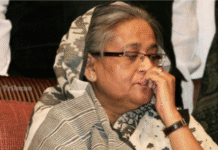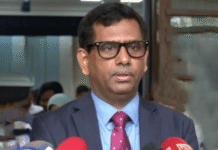The situation might be of great concern if any Ebola patient was found in neighbouring India
Despite the exponential rise of the Ebola threat worldwide, Bangladesh is still at a low risk of facing an outbreak, authorities concerned have claimed.
However, the situation might be of great concern if any Ebola patient was found in neighbouring India, said Dr Mahmudur Rahman, director of Institute of Epidemiology Disease Control and Research (IEDCR).
His comments came only days after the World Health Organisation warned that Ebola was now “entrenched and accelerating” in west Africa, while the first death of a patient outside the African continent was also recorded in the US.
Bangladesh government has so far claimed that the country has adequate safeguards in place to prevent a local outbreak of the deadly disease, which is currently killing between 50% and 60% of people infected in west Africa.
The IEDCR laboratory has the capacity to primarily identify an Ebola patient, institute’s Director Dr Mahmudur said, but he added that the identified samples would also need to be sent to the US Centers for Disease Control and Prevention (CDC) headquarters in Atlanta for a confirmed result which could take a couple of days.
Dr Be-Nazir Ahmed, member secretary of the National Ebola Monitoring Committee, claimed that all necessary arrangements had been made for the quick detection of Ebola infection and management of the patients.
Sources at the WHO local office also told the Dhaka Tribune that the global body has promised all necessary technical support to Bangladesh and requested the government to increase vigilance and screening at ports. As part of an ongoing countrywide 90-day Ebola alert, screening centres and health desks have been set up at 25 ports, including three international airports and two seaports.
However, six Bangladeshis returning from Liberia reportedly managed to pass through the Dhaka airport on October 9 without being screened for the symptoms of the virus. Following media reports on the slip-up, letters were sent to those six individuals, requesting them to report to the airport for a health check-up, said Shakhawat Hossain, sub-inspector of Shahjalal International Airport’s immigration department.
Close monitoring of suspected patients
Currently, 123 Bangladeshi and foreign nationals who had recently arrived in Bangladesh from an epidemic-hit country were being closely monitored by health officials, Dr Be-Nazir told the Dhaka Tribune.
There is no direct flight service between Bangladesh and the major Ebola-affected countries – Liberia, Sierra Leone and Guinea. Most of the travellers from these countries arrive in Bangladesh via the Middle East or other countries.
Most travellers under observation have so far entered the country through the Dhaka airport, while one entered through the Chittagong airport and around seven people through Benapole.
Among those currently being monitored, around 25 people were health workers of Brac who had been stationed in the Ebola-affected countries until they were called back because of the Ebola threat.
Around 70 others who arrived from west African countries have also passed their observation period without showing any signs of being infected.
The initial symptoms of Ebola include a sudden fever, intense weakness, muscle pain and a sore throat. The infected patient eventually suffers from vomiting, diarrhoea and in some cases both internal and external bleeding. Ebola is spread through contact and exchange of bodily fluids.
Meanwhile, 425 Bangladeshi army personnel currently stationed in Liberia as UN peacekeepers continue to be in good health with none showing any symptoms of being infected, said Maj Gen Abul Kalam Azad, director general of the Directorate General of Medical Services.
“We are getting news from them every day through email and SMS. We had provided them with personal protective equipment from Bangladesh and they also get PPE from the UN mission. There is nothing to be worried about,” he added.
Local preparations
When passengers arrive in Bangladesh from African countries, immigration officials send them to the entry port’s health desk where health officials check them for symptoms of Ebola before collecting their contact information. If they show no signs of infection, the passengers are allowed to leave; but officials concerned monitor their physical conditions for the next 21 days – the maximum incubation period of the virus – by contacting the passengers over phone.
Dr Be-Nazir Ahmed said they were focusing on three issues: identification of Ebola patients through screening, isolation and management of the patients, and arranging rapid response for potential outbreaks.
Health directorate officials said 15 isolation wards at district hospitals near the ports have been kept ready to provide treatment if any suspected Ebola patient was found. A 20-bed specialised ward is also set to be opened soon at the Kurmitola General Hospital in the capital.
Officials said 3,167 personnel – doctors, nurses and sanitary inspectors who work at the health desks at the ports – have been provided specialised training on Ebola detection, management and handling.
A senior official of the health directorate, seeking anonymity, however, said it was “nearly impossible” to properly screen all international passengers at the airports; so, the risk of anyone carrying the virus from a country other than the affected African nations and entering Bangladesh would always remain. Even developed countries like the US and Spain were unable to prevent Ebola-infected persons from entering their countries, the official pointed out.
Health Minister Mohammed Nasim on Sunday directed all officials concerned to strengthen vigilance and preparation for preventing an Ebola outbreak.
Mentioning that even countries like the US had found Ebola patients entering their country, the minister urged all to be more sincere in screening travellers from the endemic-hit countries.
During an inter-ministerial meeting on the Ebola situation, Nasim also questioned health officials on how a few passengers from the Ebola-hit countries had managed to slip through the airport without screening.
Global situation
The latest Ebola outbreak, which has so far killed more than all other known Ebola outbreaks combined, was first reported in March this year.
As of October 8, the latest Ebola outbreak has claimed the lives of at least 4,033 people in five countries – Liberia, Guinea, Sierra Leone, Nigeria and the United States. The total number of reported cases is over 8,300.
The WHO has also warned that there could be as many as 20,000 cases by November unless strong measures were taken to contain the disease. As a worst-case scenario, the US Centers for Disease Control and Prevention has predicted that the number of cases globally could mount to 1.4 million by January.
The worldwide battle to stem the outbreak was dealt with a blow when it was announced on Sunday that a Texas health care worker had tested positive for the deadly fever, the first known transmission of Ebola on US soil. The UK government’s chief medical officer has also warned that the country should expect “a handful” of people to fall ill with the disease in coming months.
Source: Dhaka Tribune










